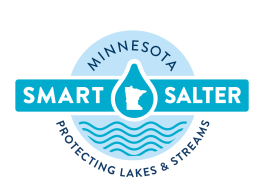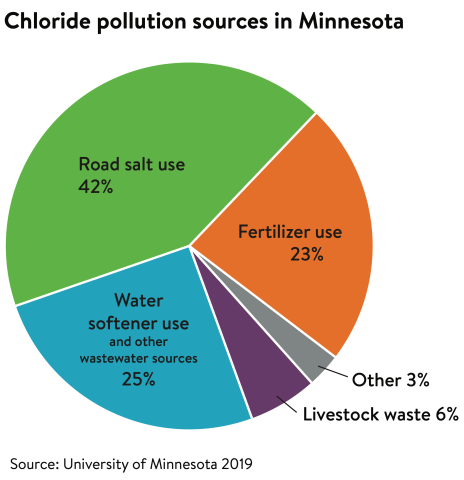
The MPCA's chloride reduction program assists communities and organizations across Minnesota in identifying sources of chloride. Together, we take steps to reduce chloride pollution at the source, protecting water resources. We offer a wide range of tools, resources, training and assistance to achieve this goal. The program consists of four pillars: collaboration and partnerships, training and education, direct assistance, and resources.
Chloride is a permanent pollutant that is toxic to freshwater fish, macroinvertebrates and native plants. Learn about chloride as a pollutant and see what the water quality chloride conditions are in your community:
Learn how organizations have reduced their salt use:
- Rebates for water softeners reduce pollution in Redwood River
- To protect lakes and fish, snowplows go on a low-salt diet
Collaboration and partnerships
The MPCA chloride reduction program collaborates with many external organizations and internal programs across the state to help facilitate positive change around chloride use. Many of the partnerships outside of the Agency allow for continued learning, new opportunities and sharing of resources.
Minnesota's chloride reduction plan
The Statewide Chloride Management Plan (CMP) outlines a comprehensive strategy to reduce salt (chloride) use from a variety of sources to protect our lakes, rivers, and other water resources. This statewide pan incorporates water quality conditions, sources of chloride, salt reduction strategies, protection strategies, and monitoring recommendations as well as measurement and tracking of results. The plan was developed by the MPCA in partnership with municipalities, counties, watershed districts and other state experts. As part of this effort, the MPCA and partners collaborated to monitor, evaluate, and better understand the level of chloride in lakes, streams, wetlands, and groundwater.
Monitoring chloride conditions in Minnesota's waters
The MPCA, USGS, Metropolitan Council and many other local organizations collect water quality data to track the health of our lakes, streams, wetlands and rivers. Much of this data is shared in the MPCA water quality database. Data shows chloride levels continue to increase in surface and groundwater across the state. In Minnesota 68 waterbodies currently exceed the water quality standard for chloride (230 mg/L) and over 100 are high risk (one or more samples with a value equal to or greater than 120 mg/L). Check out our interactive chloride conditions map to see the chloride conditions and available chloride data for surface waters across Minnesota.
Water permit holders and chloride
The chloride reduction program works closely with MPCA programs including the MS4 and Wastewater programs to ensure the program can assist with regulatory requirements associated with the various permits. Visit the water permit holders and chloride webpage for specific information regarding MPCA permit program requirements related to chloride. The Minnesota Stormwater manual includes a Road salt, smart salting and winter maintenance section for stormwater professionals.
Chloride education

Learn how to reduce salt use at home and in your community. We have compiled a variety of educational tools, programs, materials and resource developed by MPCA and our partners to help your organization educate and engage with the public about chloride pollution and actions to reduce it.
The chloride reduction program has created and manages several educational displays and kits that are available to be borrowed by local partners. Visit the MPCA’s chloride outreach and education page to learn more and request one of these tools for your next community event.
Many communities and organizations have created programs, articles, videos, and brochures and more to help educate the public about chloride pollution. The "More isn't always better" video from the City of Edina is just one example of all the great resources that have been created and are available for others to utilize. Visit our chloride outreach and education page to learn about all the chloride educational tools and resources.
MPCA Smart Salting training

The MPCA offers multiple trainings and workshop opportunities to a wide range of audiences focused on balancing public needs and reducing chloride pollution. These audience include but are not limited to winter maintenance professionals, managers and business owners, property and building managers, environmental professionals and permit staff, elected officials and board members, plumbers and water softening professionals. We offer trainings in-person and online across the state every year. Participating winter maintenance organizations have been able to reduce their salt use by 30 to 70% which results in costs savings and protection of water resources. Visit our smart salting training page to learn more about all the trainings and workshops offered.
MPCA Chloride Reduction Assistance

The Smart Salting Tool (SST) is an online resource that provides education, guidance and support to users for reducing chloride from all sources at the community level. The SST provides geographic specific estimates of chloride sources, education and resources to better understand those sources, and provides guidance on strategies for reducing chloride pollution. It also provides reporting options that are consistent with MPCA’s regulatory reporting requirements. The SST has been streamlined with the chloride variance process for wastewater facilities and can be utilized to assist with that process.
Financial assistance
Chloride reduction grants
MPCA chloride reduction grants help eligible organizations across the state to reduce chloride at the source. To date the grants have been offered every two years and will continue to be offered as funds are available. All applicants must have a Chloride Reduction Action Plan to receive grant funds and the MPCA Smart Salting Tool is a great resource to help create one for your organization!
Small business environmental assistance loan program
Businesses with 100 or less full time employees are eligible for a 0% interest rate loan for equipment upgrades that will result in reduced chloride use through the MPCA's small business environmental assistance loan program.
Clean Water Partnership loan program
Local governments and Tribal communities are eligible for a 1.5% interest loan to implement practices that reduce non-point sources of chloride pollution through the Clean Water Partnership loan program.
Additional financial assistance resources
Visit our statewide chloride resources page.
Direct assistance
Minnesota GreenCorps members
Each year the Minnesota GreenCorps program hosts GreenCorps members across the state to work on a variety of environmentally focused topics. Since 2018 there have been about 6-8 GreenCorps members that work on chloride each year across the state. In 2024 we had a total of 12 GreenCorps members working on chloride in their communities!
Check out these stories from past GreenCorps members:
- GreenCorps salt sleuths solve over-salting “mysteries” in Minneapolis
- GreenCorps training helps balance winter salt use and water quality
Chloride reduction model ordinance language
The MPCA partnered with the Nine Mile Creek Watershed District, several local cities and watershed organizations to develop a suite of model ordinances that communities can choose to implement. There are four options to consider which are intended to assist with reducing salt pollution which include occupational licensure for winter maintenance professionals, deicer bulk storage facility regulations, land disturbance permitting and parking lot, sidewalk and private road sweeping requirements. These can be used as policies as well.
Additional direct assistance resources
- Visit our statewide chloride resources page.
Guidance
Chloride monitoring guidance
We have created guidance documents for monitoring the chloride conditions or waters to help support chloride reduction efforts.
Developing a local water softener rebate program
The MPCA partnered with the Nine Mile Creek Watershed District, several local cities, watershed organizations and local water treatment professionals to develop guidance for communities interested in developing and implementing a rebate program to reduce chloride from home water softeners. This first-of-its-kind guide includes valuable information, resources, and specific examples for implementing a successful water softening rebate program.
Additional reports and guidance
- Visit our statewide chloride resources page.